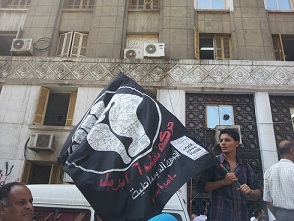
A group of demonstrators formed human chains on Sunday in front of the governorate headquarters in Mansoura in support of the ongoing partial doctors strike. Members of Al-Dostour Party, the Revolutionary Socialists, and the 6 April Movement took part in the sit-in, joining the Doctors Without Rights Movement and striking doctors.
The sit-in was organised by the movement’s strike committee in the Daqahleya governorate.
The group claims the Ministry of Health and President Mohamed Morsy’s government have ignored their demands, and do not express a vested interest in the issues raised by Egyptian doctors.
Doctors Without Rights released a statement calling on doctors to continue striking through the Eid holiday, warning that the Ministry of Health could “exploit the end of the holiday to break the strike.”
“We’ll see this Thursday if doctors have it in them to keep going. People might begin getting frustrated, but it’s an open strike and we’re determined to continue,” said Mohamed Shafiq, a member of the Doctor’s Strike Committee. “We’re tired, have put in a lot of effort, and many of our colleagues have been threatened by management and Ministry of Health officials, but we have gained confidence in collective power.
In the end, the general committee organises, but Egypt’s doctors are the ones who drive the movement.”
Despite the lack of response from the ministry, Shafiq claimed that the strikes have caused the government logistical and financial problems.
“They suffered a moral loss too because we have exposed them to the media. They are the ones who benefitted from the bad conditions and corruption, and treated hospitals like economic entities,” said Shafiq, also asserting that the “free treatment strike” had incurred significant financial losses.
Shafiq pointed to the dramatic reduction in attacks on hospitals since the beginning of the strike, giving credit to public pressure and awareness campaigns.
The group foresees a fight beyond the strike itself, and plans to strongly oppose any austerity measures put in place that would affect Egypt’s already ailing health sector.
Doctors Without Rights claims that the Ministry of Health takes one third of the overall budget allocated to it, and only distributes two thirds of it to the hospitals across the country that lack adequate equipment and security.
Doctors across Egypt began striking on 1 October, demanding a minimum salary of EGP 3,000 and better security, especially for hospital emergency rooms which have been the sites of attacks from people in various incidents.
Doctors demanded a higher portion of the government’s budget to be set aside for the health sector, claiming that it currently does not exceed five per cent.

